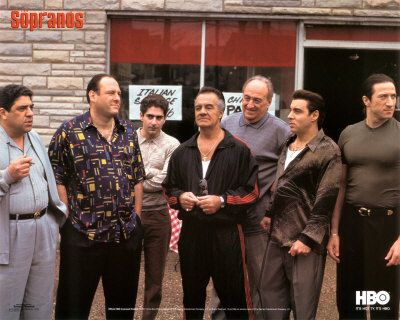
The Sopranos Has Been Labelled the ‘Greatest TV Show of All Time’: Here’s Why
When The Sopranos premiered on HBO in 1999, few could have predicted the lasting cultural impact it would have. The show went on to define a new era for television, raising the bar for everything that came after it. Almost two decades since its finale, The Sopranos remains a frontrunner in the race for the title of “Greatest TV Show of All Time.” But what is it about this groundbreaking series that still captivates audiences and critics alike?
In this article, we’ll explore the reasons behind its enduring reputation, from its complex characters and unforgettable storytelling to its lasting impact on TV history. So, sit back and let’s take a deep dive into why The Sopranos is still revered as the greatest.

The Revolutionary Impact of The Sopranos
Before The Sopranos, TV shows were often relegated to a simpler format—episodic plots with neatly tied-up endings. The show disrupted this structure by offering something deeper, darker, and more complex, setting the stage for the golden age of television. This was a show that didn’t just entertain; it made you think, feel, and question everything.
Breaking Away from Traditional TV Drama
The Sopranos wasn’t just about mobsters—it was about the human experience. The show blended family drama, psychological exploration, and crime in a way that had never been seen before on the small screen. Its daring narrative choices forced viewers to confront uncomfortable truths about identity, power, and morality, setting it apart from everything else on TV at the time.
Pioneering the Antihero Era
Tony Soprano, played by the legendary James Gandolfini, was an antihero in the truest sense. He wasn’t your typical good guy or bad guy—he was both, often within the same episode. This made him a complex and multi-dimensional character that viewers couldn’t easily categorize. This shift toward morally ambiguous protagonists paved the way for future TV antiheroes like Walter White from Breaking Bad and Don Draper from Mad Men.
Unmatched Character Development in The Sopranos
One of the defining features of The Sopranos is its character development. At the heart of the series is Tony Soprano, a mob boss struggling with both his criminal life and his role as a father and husband. What sets the show apart is the profound depth given to every character, not just Tony.
Tony Soprano: A Complex Antihero
Tony’s internal struggle between his violent mafia lifestyle and his desire for normalcy made him a fascinating character. His moments of vulnerability, particularly during his therapy sessions with Dr. Jennifer Melfi, gave the audience a deeper look into his psyche. These sessions were crucial in allowing viewers to understand the man behind the mob boss persona—full of fears, insecurities, and contradictions.
The Supporting Cast: Brilliantly Written and Acted
While Tony’s arc is undoubtedly the focal point, The Sopranos also excelled in crafting rich, multifaceted supporting characters. Carmela, his wife, played by Edie Falco, showcased the complexities of being married to a mob boss, grappling with her own desires for wealth and stability. Characters like Paulie Walnuts, Christopher Moltisanti, and Dr. Melfi were more than just sidekicks—they were central to the narrative and essential to the show’s thematic depth.
Incredible Writing and Storytelling
The writing on The Sopranos is nothing short of genius. Created by David Chase, the show took risks in its narrative structure, choosing to focus on character-driven plots rather than traditional mob action. The writing allowed for deeper exploration into themes like family loyalty, mental health, and the American dream.
Unpredictable and Deeply Layered Story Arcs
Unlike many shows that relied on predictable arcs and resolutions, The Sopranos kept viewers on edge with unpredictable twists and deep emotional storylines. The long-term character arcs and relationships made the stakes feel real, and every decision Tony made had consequences that rippled through the entire family and criminal enterprise.
Masterful Use of Symbolism and Themes
Throughout the series, The Sopranos employed powerful symbolism to enhance the story. From Tony’s dreams and therapy sessions to the show’s use of visual motifs, every detail served a purpose in conveying deeper meanings. The exploration of identity, power, and the search for meaning in life became central themes, with the show consistently challenging viewers to question their own understanding of morality and self-worth.
Cultural and Societal Impact
The Sopranos didn’t just change television—it changed culture. It helped establish the idea that TV shows could be just as impactful and artistically valuable as film. As one of the first shows in what is now considered television’s golden age, The Sopranos set the stage for future masterpieces.
Redefining TV as a Serious Art Form
When The Sopranos premiered, TV was still often considered a secondary medium to film. However, the show proved that television could deliver complex narratives, explore deep psychological themes, and feature nuanced characters, just like the best movies. This helped usher in the era of TV dramas like The Wire, Breaking Bad, and Mad Men, which all took inspiration from the blueprint set by The Sopranos.
The Global Influence of Tony Soprano
Tony Soprano became more than just a character—he became a cultural icon. His journey mirrored the struggle many people face in trying to balance personal and professional lives, especially when confronted with moral dilemmas. The Sopranos also raised questions about the American dream, success, and what it means to be truly “happy.” This resonance across cultures and societies is part of why The Sopranos remains so revered.
The Cinematic Quality of The Sopranos
It’s not just the story or characters that make The Sopranos special—it’s also the way the show looks and feels. With its stunning cinematography, memorable soundtracks, and expert direction, the show felt like a film every time it aired.
Visually Stunning: Cinematography That Tells a Story
The Sopranos was as visually stunning as it was narratively rich. The show’s cinematography was a significant factor in its overall impact, using everything from subtle camera angles to sweeping landscapes to create meaning and add depth to the story. The suburban settings contrasted with the violent underworld, enhancing the show’s thematic exploration of duality and the tension between appearances and reality.
The Power of Music and Sound Design
From the opening credits featuring the song “Woke Up This Morning” by Alabama 3 to its diverse soundtrack, The Sopranos used music to convey emotion, set tone, and reinforce key themes. The show’s sound design played a pivotal role in heightening the sense of dread or melancholy, while the music often served as an unspoken reflection of the characters’ inner turmoil.
The Legacy of The Sopranos
As The Sopranos continues to influence television and pop culture, its legacy is undeniable. The show raised the bar for all TV dramas that followed, and its impact will be felt for years to come.
Enduring Popularity and Critical Acclaim
Even years after its conclusion, The Sopranos remains as popular as ever. The show’s critical acclaim, multiple awards, and vast influence on the television industry have solidified its place in pop culture. The Sopranos didn’t just end—it became a permanent fixture in the conversation about what makes great television.
A Timeless Classic
At its core, The Sopranos is a timeless classic because it continues to resonate with new generations of viewers. Its complex storytelling, iconic characters, and exploration of universal themes ensure that the show will remain relevant for decades to come. It wasn’t just a product of its time—it was ahead of its time.
Conclusion: The Timeless Masterpiece of The Sopranos
The Sopranos has earned its place as the greatest TV show of all time because it redefined what television could be. Through unforgettable characters, groundbreaking writing, and cinematic brilliance, it created a new standard for storytelling. Today, its legacy lives on, inspiring countless shows that followed, and continuing to captivate audiences old and new.
If you haven’t experienced The Sopranos yet, now is the perfect time to dive into one of the most influential TV series ever made.
FAQs
- What makes The Sopranos the greatest TV show of all time? The Sopranos redefined the medium with its complex characters, unpredictable storytelling, and deep exploration of themes like family, identity, and morality. It set the standard for modern TV dramas.
-
How did The Sopranos influence modern TV shows? The show pioneered the antihero archetype, influenced shows like